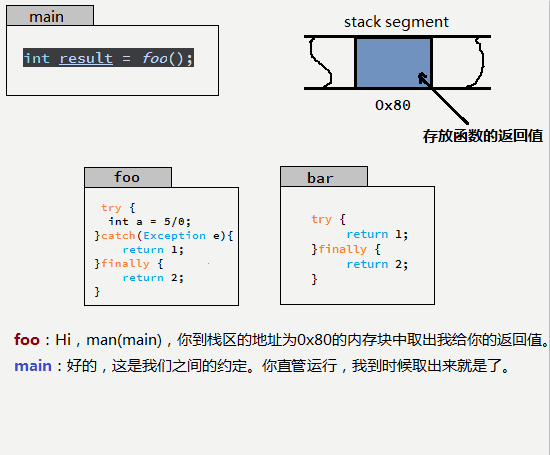finally块和return
首先一个不容易理解的事实:在 try块中即便有return,break,continue等改变执行流的语句,finally也会执行。
public static void main(String[] args)
{
int re = bar();
System.out.println(re);
}
private static int bar()
{
try{
return 5;
} finally{
System.out.println("finally");
}
}
/*输出:
finally
*/
很多人面对这个问题时,总是在归纳执行的顺序和规律,不过我觉得还是很难理解。我自己总结了一个方法。用如下GIF图说明。

也就是说:try…catch…finally中的return 只要能执行,就都执行了,他们共同向同一个内存地址(假设地址是0×80)写入返回值,后执行的将覆盖先执行的数据,而真正被调用者取的返回值就是最后一次写入的。那么,按照这个思想,下面的这个例子也就不难理解了。
finally中的return 会覆盖 try 或者catch中的返回值。
public static void main(String[] args)
{
int result;
result = foo();
System.out.println(result); /////////2
result = bar();
System.out.println(result); /////////2
}
@SuppressWarnings("finally")
public static int foo()
{
trz{
int a = 5 / 0;
} catch (Exception e){
return 1;
} finally{
return 2;
}
}
@SuppressWarnings("finally")
public static int bar()
{
try {
return 1;
}finally {
return 2;
}
}
finally中的return会抑制(消灭)前面try或者catch块中的异常
class TestException
{
public static void main(String[] args)
{
int result;
try{
result = foo();
System.out.println(result); //输出100
} catch (Exception e){
System.out.println(e.getMessage()); //没有捕获到异常
}
try{
result = bar();
System.out.println(result); //输出100
} catch (Exception e){
System.out.println(e.getMessage()); //没有捕获到异常
}
}
//catch中的异常被抑制
@SuppressWarnings("finally")
public static int foo() throws Exception
{
try {
int a = 5/0;
return 1;
}catch(ArithmeticException amExp) {
throw new Exception("我将被忽略,因为下面的finally中使用了return");
}finally {
return 100;
}
}
//try中的异常被抑制
@SuppressWarnings("finally")
public static int bar() throws Exception
{
try {
int a = 5/0;
return 1;
}finally {
return 100;
}
}
}
finally中的异常会覆盖(消灭)前面try或者catch中的异常
class TestException
{
public static void main(String[] args)
{
int result;
try{
result = foo();
} catch (Exception e){
System.out.println(e.getMessage()); //输出:我是finaly中的Exception
}
try{
result = bar();
} catch (Exception e){
System.out.println(e.getMessage()); //输出:我是finaly中的Exception
}
}
//catch中的异常被抑制
@SuppressWarnings("finally")
public static int foo() throws Exception
{
try {
int a = 5/0;
return 1;
}catch(ArithmeticException amExp) {
throw new Exception("我将被忽略,因为下面的finally中抛出了新的异常");
}finally {
throw new Exception("我是finaly中的Exception");
}
}
//try中的异常被抑制
@SuppressWarnings("finally")
public static int bar() throws Exception
{
try {
int a = 5/0;
return 1;
}finally {
throw new Exception("我是finaly中的Exception");
}
}
}
上面的3个例子都异于常人的编码思维,因此我建议:
- 不要在fianlly中使用return。
- 不要在finally中抛出异常。
- 减轻finally的任务,不要在finally中做一些其它的事情,finally块仅仅用来释放资源是最合适的。
- 将尽量将所有的return写在函数的最后面,而不是try … catch … finally中。